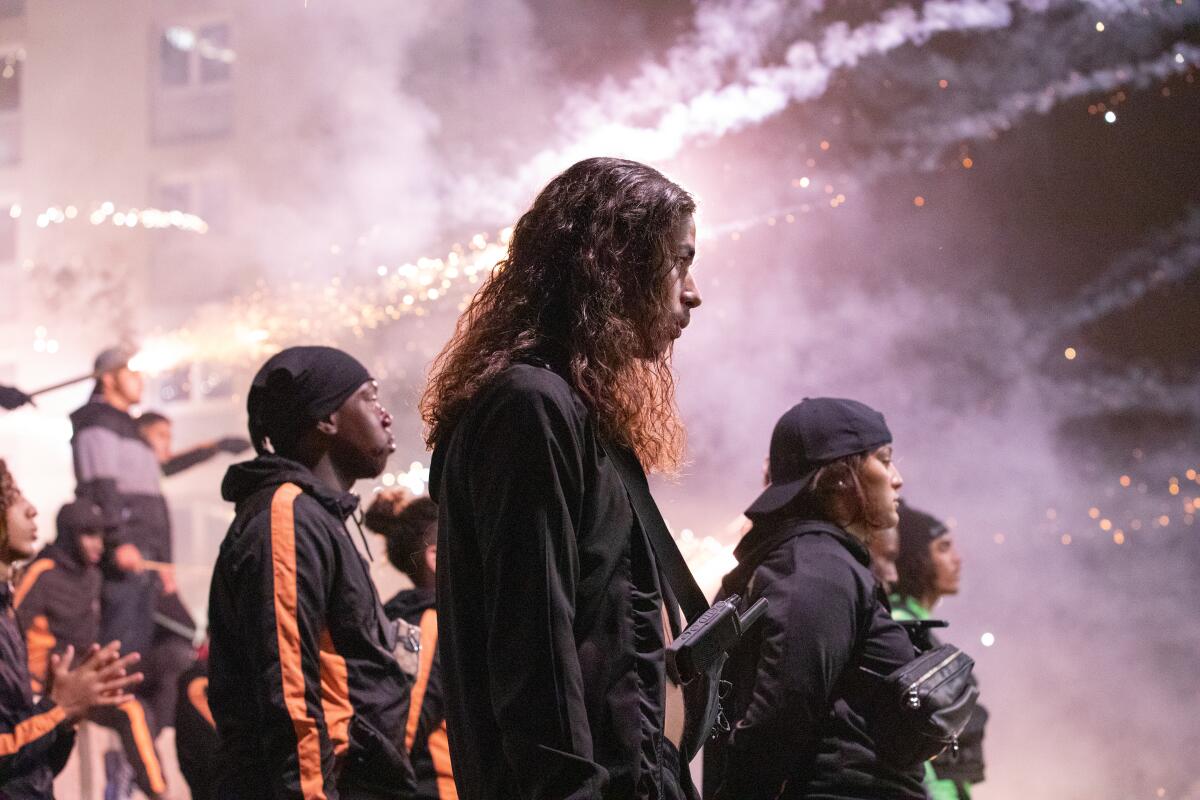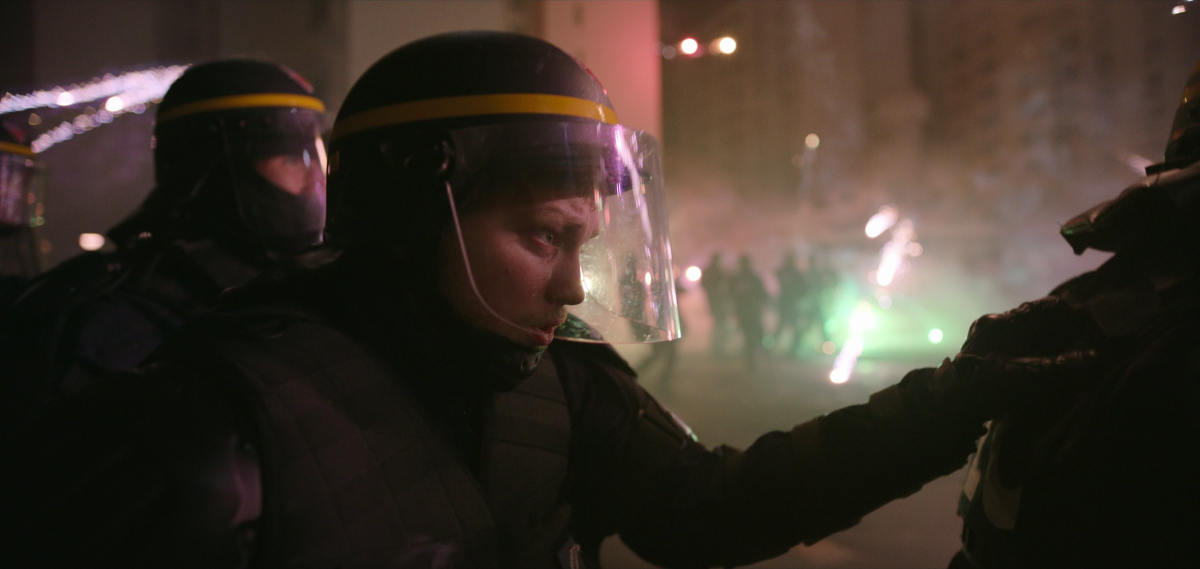‘Athena,’ a fiery drama of civil unrest, is mostly blowing smoke

- Share via
Romain Gavras’ “Athena” opens with a single-take sequence so intricately choreographed, and so breathtaking in its visual sweep and emotional force, it’s almost a shame that there’s another 90 minutes or so of movie to go along with it. It begins at a news conference where a French soldier, Abdel (Dali Benssalah), gravely acknowledges the recent killing of his 13-year-old brother, Idir, during an apparent altercation with police. The tragic incident — the third instance of police brutality in two months, blares a news report — was captured in a video that’s since gone viral; with the community in an uproar, Abdel has been called upon, at great personal cost, to help control the damage. But that objective is clearly futile once another man, Karim (Sami Slimane), hurls a Molotov cocktail, igniting this tinderbox of a movie and turning these already tense environs into a full-blown war zone.
Gavras’ decision to film all this mayhem in one shot — or something that looks an awful lot like one shot — forges a visual link between Abdel and Karim, which is hardly an accident. It’s soon revealed that the two men are brothers, though their shared grief at Idir’s death has pulled them in radically different directions. The shot keeps unspooling, never blinking: With pulse-pounding virtuosity (the cinematography is by Matias Boucard), the camera plunges after Karim and other angry young men as they ransack the police station, steal a cache of weapons and then joyride their way back to the Athena housing estate they call home. And this place is their home, a sentiment they underscore by unfurling a French tricolor along the way: It’s a defiant declaration of belonging in a country that hasn’t always claimed them in return.
Before long, another flag — an Algerian flag — will burst into the frame, an emblem of these young men’s North African lineage that subtly ties “Athena” to any number of political thrillers about French colonialism and Algerian resistance. At the same time, the emphasis on police brutality carries a topical edge that transcends strict cultural and geographical borders; you might be reminded of American headlines both recent and distant. You might also be reminded of 2019’s Oscar-nominated “Les Misérables,” a blistering banlieue drama written and directed by Ladj Ly. If “Athena” doesn’t achieve the same power (even with Ly credited as a co-writer with Gavras and Elias Belkeddar), it’s partly because its politics ultimately feel like a feint — a prop in a story that cares less about its characters, and the vast array of human experiences they represent, than about its own formal virtuosity.
Still, let’s give that virtuosity its due. Gavras’ work here may court comparisons with the tense political thrillers made by his father, Costa-Gavras (“Z,” “Missing”), but his skill with the camera has long been in evidence. (Before his earlier features, “Our Day Will Come” and “The World Is Yours,” he directed music videos for artists including M.I.A., Jay-Z and Kanye West.) Thanks to the magic of digital editing, the elaborate long-take sequences of the kind he attempts here may be easier to pull off than they were when, say, Orson Welles was shooting “Touch of Evil.” Still, Gavras shows impressive commitment to the technique as he plunges Athena (or “Athena!” to judge by the rallying cries of the crowd) into a state of siege. The camera keeps moving and moving as chaos erupts, angry male bodies jostle one another in the frame, and sparks and flares light up the night sky, illuminating a battlefield crammed with helmets and riot shields. The physical verisimilitude is both jolting and enveloping.
As a sustained piece of action choreography, then, “Athena” is frequently staggering. As a drama about police violence, the woes of a long-ignored underclass and the complexities of modern French identity, the movie feels thin and overdetermined. Gavras has composed the story as a sweeping symphony of civil unrest, pushed to grimly operatic heights by the intensity of the performances, the wailing choral crescendos of Gener8ion’s score and, above all, the unyielding gaze of the camera. He lunges for both the urgency of a news headline and the fatalism of a Greek tragedy, which essentially means he proffers gritty realism with one hand and embraces bald contrivances with the other.

There’s something a little too dramatically expedient about the way “Athena” centers its story on not two but three squabbling brothers, each representing a different face of immigrant rage. For a while, Abdel is the peacemaker caught in the middle, determined to quell unrest and help the residents of Athena evacuate safely. Karim, his long hair marking him as this story’s romantic revolutionary, wants Idir’s killers publicly identified and brought to justice, and he’s willing to make a hostage of a young cop (a sympathetic Anthony Bajon) to ensure that happens. The eldest of the siblings is Moktar (Ouassini Embarek), a drug dealer trying to smuggle his way out of a nightmarish situation. Unlike his brothers, he cares and stands for nothing except his profits.
As forcefully inhabited as these characters are — especially by Benssalah and Slimane, who make Abdel and Karim’s brotherly love as palpable as their fury — they rarely come across as more than pieces moved about at will in a fiery, doom-laden chess game. Even more of a cipher is Sébastien (Alexis Manenti), a mysterious figure — but not, thankfully, another brother — who skulks with wordless menace around the periphery of the story, then ushers it toward its grim if spectacularly photogenic finale. In these moments, “Athena” shows it likes to play with fire, though mainly because of how cool it looks.
‘Athena’
In French and Arabic with English subtitles
Rating: R, for language and violence
Running time: 1 hour, 37 minutes
Playing: Starts Sept. 23 on Netflix
More to Read
Only good movies
Get the Indie Focus newsletter, Mark Olsen's weekly guide to the world of cinema.
You may occasionally receive promotional content from the Los Angeles Times.











